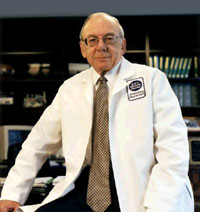|

Dean
Robert Glickman: NYU School of Medicine Continuing
a Family Tradition
By
Jacob M. Appel
“Medicine
is under attack these days,” says Dr. Robert Glickman, the Dean
of the New York University School of Medicine. “Doctors are finding
themselves in the middle of the debates about the U. S. health
care system and they are no longer at the top of the economic
ladder. Of course, the great advantage of medicine is its flexibility.
There are so many things one can do with a medical degree–in the
sciences, in public health, genomics, consulting, venture capital.
And the science is wonderful with many new therapies and new drugs.”
The dean, an affable gastroenterologist who cuts a very polished
figure, leans back in his chair and adds: “It can be extremely
interesting and challenging work.”
Glickman’s own current position is unquestionably more interesting
and more challenging that most. As the fourteenth director of
a 160 year-old medical school with more than 1300 full-time faculty
and nearly 700 medical students, he’s running a school that trains
the faculties for other medical schools. Almost 80 percent of
his students engage in research while at NYU; half of all NYU
graduates pursue careers in academics. Glickman admits that bringing
innovation to such a celebrated and often unwieldy institution
takes both determination and a willingness to proceed slowly.
“We’ve
been working on improving teaching,” he explains, “but in this
environment we need to go about it in sequential steps. Most of
our senior faculty do a wonderful job, but we can always do better.
At the outset we defined teaching as the responsibility of a faculty
member. That was new to some people. But we need to start off
by raising the level of expectation.” What next? “That’s the more
difficult part,” Glickman says. “We know who the strong teachers
are and who the weak teachers are. I assure you we get feedback.”
Then he leans forward and adds in his convincing let-me-tell-you-a-story
voice: “My wife used to ask me to wash the dishes. One day I finally
agreed and I washed them in cold water. She never asked me again.”
He shakes his head and notes that there will always be a few faculty
members who teach the way he cleans dishes.
If Glickman is examining the quality of instruction, he is also
rethinking the content of the material being taught. “We’ve always
stressed the importance of a combination of knowledge of the basic
sciences and compassionate care. What we’re looking at now is
taking courses away from individual departments. Students used
to learn how kidneys worked one month and how hearts worked the
next. Now we’re trying to emphasize the importance of knowing
how whole systems function.” Other items are also on the agenda
for a curriculum that relies heavily on medical student societies,
student-run groups that function as part club, part social fraternity
and part professional organization. For example, many students
are electing to do work in the burgeoning field of bioethics.
On another front, Pfizer recently offered the school a grant to
implement a “humanities in medicine” program.
“Medical
school shouldn’t be a default choice,” Glickman admonishes prospective
applicants. “You should try to figure out if science and medicine
is something that truly interests you.” When Glickman was in high
school, he won honorable mention in the Westinghouse scholarship
competition for a project that involved radiating bacteria and
making them change color; he urges today’s young scientists to
take similar risks. “Show a degree of commitment and passion,”
he exhorts. “Try to develop a deep interest in something.”
Glickman is a graduate of the Harvard Medical School and an expert
in the field of lipoproteins and fat absorption. He cites among
his influences endocrinologist Daniel Fetterman, William Castle
who cured pernicious anemia, and the noted gastroenterologist
Kurt Isselbacher. “They were all distinguished teachers,” he recalled.
“I was very lucky.”
What lured Dean Glickman into the medical field in the first place?
“My father was a physician. He was a general practitioner in Flatbush
and in Williamsburg [Brooklyn]. I went to medical school based
primarily on what I’d seen at my dad’s office.” Whatever he saw
must either be genetic or contagious, because he quickly points
out that he has two sons and two daughters-in-law who are also
physicians. “It’s a great career,” he explains. “It’s one of the
few things you can do where you don’t get pigeon-holed at the
beginning.”
Education Update, Inc., P.O. Box 20005, New York, NY 10001. Tel:
(212) 481-5519. Fax: (212) 481-3919. Email: ednews1@aol.com.
All material is copyrighted and may not be printed without express consent of
the publisher. © 2001.
|

